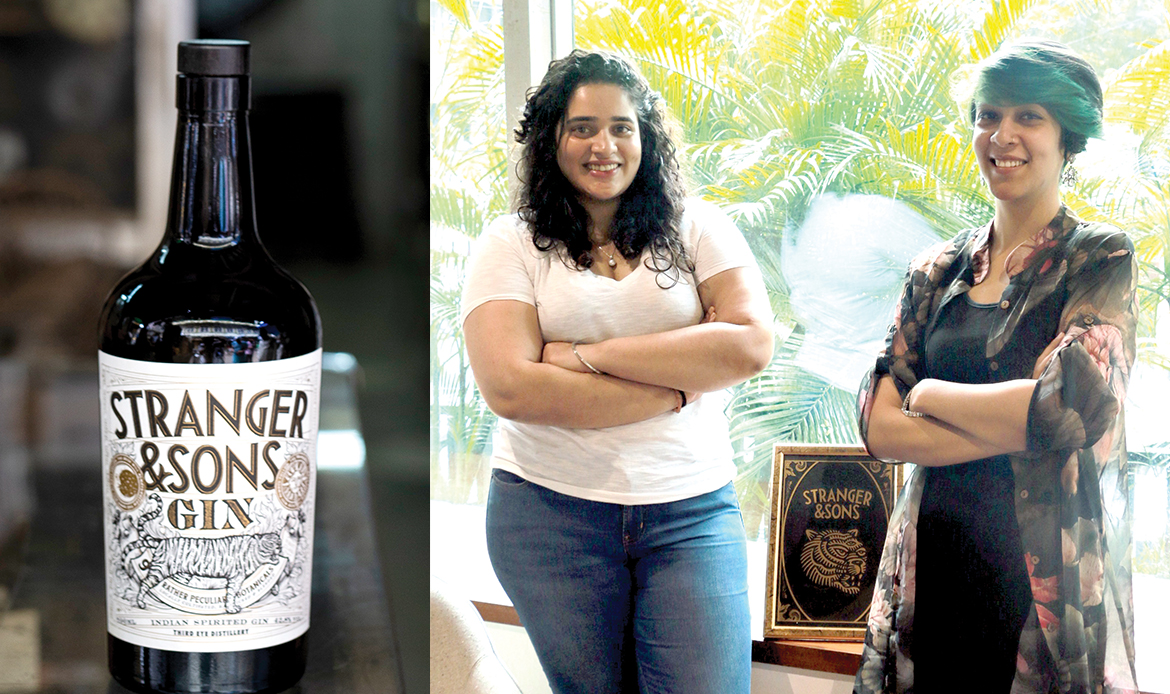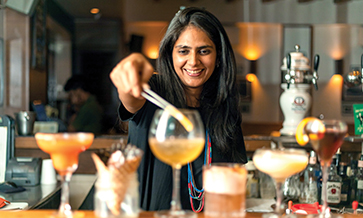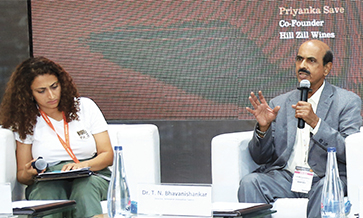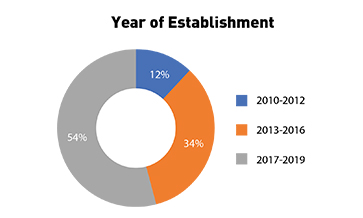A dare-to-dream-big, all-women team is at the helm of the new ‘Gin Renaissance’ in India, steering ‘Stranger & Sons’ through the haze of spirits, a maze of botanicals, and a rollercoaster market. Brews & Spirits attempts to find out what makes these ladies click!
There is little that is in common between ‘Strangers & Sons’ and most other gins launched in India so far. Going beyond the customary juniper, black pepper, nutmeg, mace, coriander, angelica, citrus peels, liquorice and cassia bark, the makers of this brand compare its distilling process to an Indian musical jugalbandi, where each ingredient fights for its rightful place in the final raga.
Founded by Sakshi Saigal, her husband Rahul Mehra, and her cousin Vidur Gupta, Third Eye Distillery in Goa is attempting to showcase India’s diversity by boosting the craft spirit culture in the country. Taking the dream of the founders forward is an all-women team: Sakshi herself, Mitali Dandekar, Charnelle Martins and Feruzan Bilimoria.
The co-founder, and now CEO, Sakshi completed her MBA from Barcelona; then shifted to the Netherlands with her husband and cousin to complete a distilling course, before returning to India to start her own venture. While living in Spain, she realised it was time to create a truly Indian gin for a local and global audience, and launched ‘Stranger & Sons’ in October 2018.
For Sakshi it was a conscious decision to hire more women. “The women in our team are there for their skills and contributions. More than just having a healthy gender diversity, we believe that a balanced team is a more powerful and productive one.”
Rather than exalting the virtues of any particular gender, she feels it is more important to cultivate a respectful and encouraging environment. At ‘Stranger & Sons’ it goes beyond the immediate team at the Third Eye Distillery in Goa.
Says Sakshi: “We extend this to our communities wherever possible. We have a local self-help group of women who visit our distillery on the day we’re distilling our gin. They help us peel the citrus fruit. We usually have no need for the fleshy part of the citrus fruits, so they take them back with them to make traditional jams and pickles, which they sell at local markets.”
For Sakshi it is exciting to be constantly more mindful about waste. She wants to make the distillery more responsible and sustainable wherever possible. “We have already noticed more women bartenders, especially at bars across Mumbai – The Bombay Canteen, O’Pedro and Qualia,” she notes.
Organic connect
Many in the alcobev industry feel gin is the most hyped category at the moment… Sakshi reads our thoughts and notes that all spirits go through this pattern of cyclical consumption. The current generation rarely drinks what their parents drank in their time, almost like a quiet rebellion, she adds.
The main reason for the trend towards gin is because there is so much one can do with it and how approachable it is as a spirit. Even though there is such a deep history of its origins, gin provides enough room for the distiller to experiment and make a distinct flavour profile, Sakshi notes.
She agrees there is substance behind the hype because there are many interesting and fantastic gins being produced which, apart from being unique expressions, tell a story that they believe in.
“Stranger & Sons’ also tells a story of the provenance of Indian botanicals, the deep-rooted ties between gin and India, with a whimsical touch that expresses the wonderful strangeness in every corner of the country,” says Sakshi, adding that this allows consumers to connect with the story and the brand in a very organic manner.
Mythical magic
The tiger may be perceived as a more masculine device. We ask Mitali if it works well with a category like gin, where the appeal is more unisex.
“Our tiger is actually a tigress!” she retorts. “The inclusion of our very own mythical creature is a tribute to those we have grown up hearing stories about, while retaining a contemporary ethos.”
‘Stranger & Sons’ mythical creature is a two-tailed, three-eyed mythical creature with three paws and one hand. “It helps us tell our stories in a whimsical and nostalgic manner. We use story-telling as a way of reinforcing our brand ethos, and stories appeal to everyone, regardless of gender,” Mitali adds.
She is a food and beverage management graduate, a high-ranking cocktail-maker with the Oberoi chain of hotels, and a multi-tasking leader with Bacardi India, before joining ‘Stranger & Sons’ in early 2019. A lover of everything “bad and boozy”, Mitali is excited about giving India the experience of a home-grown premium gin.
So, who does Mitali think sets drinking trends in India? The eco-system of gin is fairly saturated but, she believes, consumers choose the gin they drink – firstly because they prefer that expression of gin, and secondly because of the story and the values of the gin.
‘Stranger & Sons’, she says, is an ode to contemporary India, proudly celebrating the cultural diversity, knowledge and traditions of India. “Our drinks strategy also focuses on using seasonal fruits and Indian elements to bring out the provenance of India in our own (errr) Strange way.”
Brand equity
As Brand Ambassador, Feruzan is aware of the role she plays to support the marketing and sales teams to implement strategies for growth, as well as build advocacy for the distillery’s spirit and cocktails.
“Being an eccentric Parsi, I think I fit in well with a brand like ‘Stranger & Sons’, which focuses on our heritage of story-telling and embracing the wonderfully strange aspects of India,” she beams.
Feruzan is an internationally acknowledged mixologist who has worked with the Marriot group of hotels and London Taxi, before taking on the mantle of Brand Ambassador for ‘Stranger & Sons’.
And yes, it is definitely helpful to understand the economics of handling both a brand as well as a restaurant. “At the end of the day, it is a business role. It would fall on me to translate the ideology of a quirky brand like ‘Stranger & Sons’ through various media – cocktails, events, social media, or even my dressing style,” she adds.
For Charnelle, it was a journey of self-discovery. She always loved science and was curious about flavours and food, tasting her way through everything in the kitchen. She often brewed wine and made liqueurs at home, but wasn’t sure how to make a career of it.
Charnelle is an alcobev scientist who heads distillery operations for ‘Stranger & Sons’. She has a Master’s degree in Food and Alcohol Bio-technology, and a diploma in distillery operations from the UK. What’s more, she is a certified (water) diver and instructor.
“What drew me to distilling is the creativity and ability to express new ideas through spirits. I excelled at my degree and got the opportunity to intern with the Scotch Whisky Research Institute (SWRI) in Edinburgh,” she says, adding, “It’s definitely not a 9-to-5 cookie cutter career path; but I wouldn’t want to do it any other way.”
Gender minder
How does this flock of entrepreneur, bio-engineer and mixologists crack it in a male dominated industry in India? For Mitali working in the alcohol industry has often worked to the advantage of the brand she represents – but she agrees that the industry still needs to work to make all commercial roles more accepting of women.
“A lot more women are consuming alcohol due to rising social acceptance in developed markets. It makes sense to have women in representation for new age brands as they make up a large number of the consumers being targeted,” she notes.
Feruzan has worked in kitchens and bars that are male dominated. Work in both these fields is very stressful. “I feel work is much better when there is a balance of both genders, because they cancel out each other’s differences and add to each other’s benefits,” she says.
When a woman is introduced to the bar, she says, the personality of the team changes for the better. The men will often take on a brotherly role in order to make the woman comfortable because they know how stressful it can get. The woman will offer the men a chance to get in touch with the softer side of their personalities.
“This is beneficial to the customer as well as the management since it empowers both genders to work side by side and be more understanding of the other person’s emotions and abilities,” says Feruzan.
Distilleries in India have for the longest time been a male dominated space because of the social taboo associated with alcohol. However, the spirits industry looks quite different today, with women bartenders, brand ambassadors, brewers, distillers and even distillery owners.
Charnelle says, “In a technical role it’s more about your talent and skills. There have been times when I have faced a bit of sexism; but you work harder and better to prove them wrong.”
Women have 50% larger olfactory centres in their brains and statistically tend to detect more flavours than men. “So, trust me when I say the lady nose best!” she remarks.
Seeking inspiration
This band of women has had their own mentors in the industry. Mitali took the industry seriously only after qualifying as the only woman and competing in the national finals of the Bacardi Legacy Cocktail contest. “Interestingly, I work today with one of the judges of the competition, Dimi Lezinska,” she says.
Working with Sakshi also is very inspiring. As women it is incredibly important to support and cheer each other on, she says, adding, “I also credit my parents, who were not only incredibly supportive of my interest and career in this industry, but have actively cheered me on.”
Feruzan has been inspired by people such as Anthony Bourdain, Marco Pierre White and Ada Coleman (first woman head bartender of the Savoy), who have all made tremendous marks in their respective fields. “But I’ve always looked up to myself to keep improving with every step I make in my career,” she says.
Charnelle’s university professor, Dr Graeme Walker, saw the hidden talents in her. His knowledge and research in the field continues to inspire the bio-technologist.
“My dad always let me sample his liquor cabinet because he said it’s important to know what good alcohol tastes like! Unknowingly at that time he made me appreciate the finer nuances of good alcohol and set me on the path of becoming a distiller,” Charnelle recollects.
Spanish connection
Sakshi is probably the only woman entrepreneur in the craft beer and spirits space. Why did she choose gin? “When I was living in Barcelona literally every gin bottle I would come across had sourced botanicals from India. I came back to Mumbai with the idea of setting up a gin brand,” she responds.
After dabbling with the idea for a couple of months – and tasting more than 300 gins! – Sakshi, Rahul (husband and co-founder of Gateway Brewing and Svami Drinks) and cousin Vidur immediately jumped on to the idea.
“We went to the Netherlands to attend a 10-day course on distilling and ended up purchasing a still that we imported to India. I would say it’s our love for gin and all other spirits that brought us together to start Third Eye Distillery,” says Sakshi.
But why ‘Stranger & Sons’? “A lot of people have asked me this question. Our brand is built around creating some intrigue, a pun on Indian businesses and traditions and bringing out the diversity and wonderful strangeness in India. We went with a name that, at first would not sound like a conventional Indian brand, but is an inherently Indian gin.”
Signing off
What, we asked the ladies, are their desert island drinks? For Sakshi, it is a simple Stranger G&T with light tonic water – such as Svami – and a slice of ginger. Feruzan insists that for her it will always be a Stranger Negroni.
“But I’m very sure that being stranded on a deserted island, I’d have access to various ingredients to keep making different drinks for myself. What’s the point of all my experience and knowledge then?” she remarks.
For Mitali it would be a Gibson, with lots of interesting pickles that she may find and make from around the island! Charnelle goes with an Old Ffashioned and all of its variations. “It’s simple to make, but complex in flavour. Swapping the spirit allows for me to never get bored!” she signs off.














